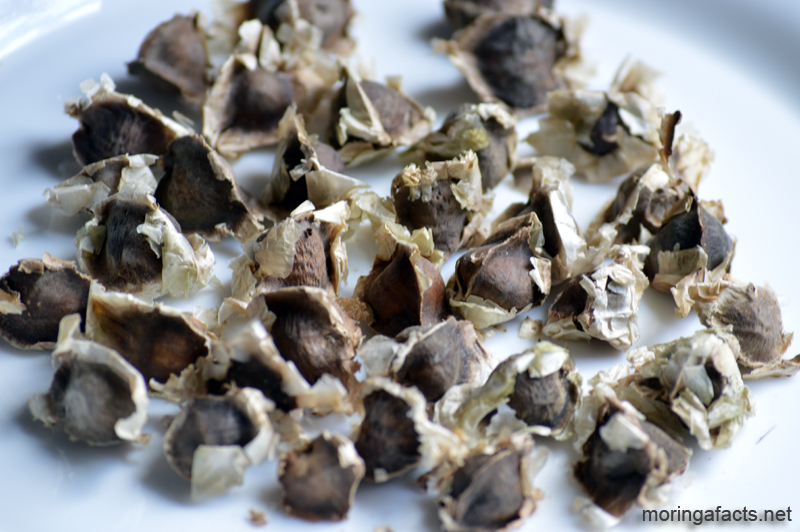Moringa seeds are large and circular-shaped, and grow inside the pods of the Moringa Oleifera tree. The pods can reach over a foot in length and contain over a dozen seeds. These seeds have their own wings so the wind can carry them to fertile ground far away from the parent plant.
Fresh Moringa seeds are usually soft, and as they dry out, they harden until they resemble a dried bean or pea.
Seeds could be harvested for oil production in which case they are immediately processed. If cold-pressed they produce up to 40 % oil by weight. If not used for oil, they can be used as food. They are also packed with nutrients.
Moringa seeds can be steamed or boiled, either in the pod or shell, just like peas or green beans. Another way would be to season, roast and use them as a snack food. Roasted they have a pleasant “nutty” taste.
The seed cake, which remains after the oil has been extracted, or seed powder are both effective flocculent (coagulant) to purify cloudy or dirty water. When added to dirty water and stirred, seeds pull together floating particles (dirt, other solids, and some germs and worms), and when the water settles, the particles sink to the bottom.
Note: Moringa seeds should not be used as the only method of treating water because it does not make water completely germ free. Next step would be to filter water through fine cloth or solar disinfection; chlorine should never be used because of its chemical reaction with Moringa seeds.
Moringa seeds medical uses:
- Moringa seeds are used for their antibiotic and anti-inflammatory properties to treat arthritis, rheumatism, gout, cramp, sexually transmitted diseases and boils. The seeds are roasted, pounded, mixed with coconut oil and applied to the problem area. Seed oil can be used for the same ailments.
- Roasted seeds and oil can encourage urination.
- They can also be used as a relaxant for epilepsy.
- Moringa seeds are effective against skin-infecting bacteria – Staphylococcus aureus and Pseudomonas aeruginosa. They contain the potent antibiotic and fungicide terygospermin.
- The seeds are used against fevers.
- In Aruba, the seeds are crushed and made into paste that is applied to warts.
- It is also used to treat skin disease.

